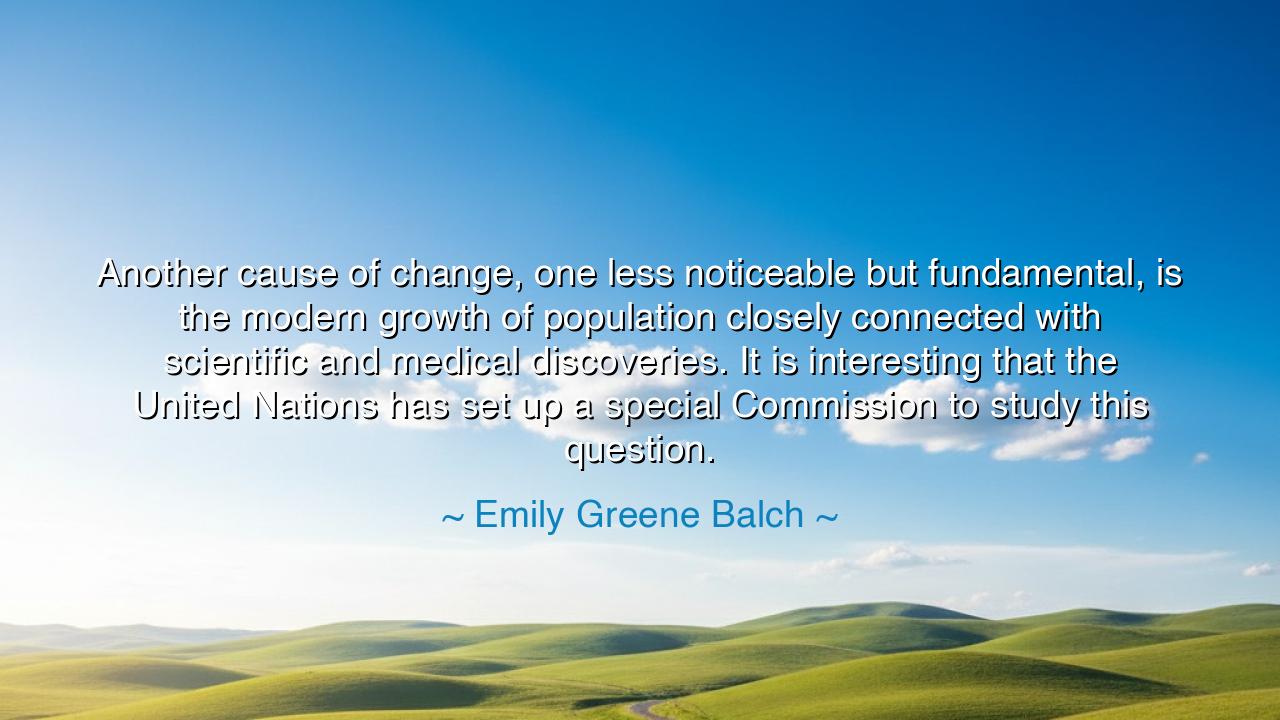
Another cause of change, one less noticeable but fundamental, is
Another cause of change, one less noticeable but fundamental, is the modern growth of population closely connected with scientific and medical discoveries. It is interesting that the United Nations has set up a special Commission to study this question.






In the words of Emily Greene Balch, spoken with the foresight of one who saw the tides of history shaping humanity’s fate, we hear: “Another cause of change, one less noticeable but fundamental, is the modern growth of population closely connected with scientific and medical discoveries. It is interesting that the United Nations has set up a special Commission to study this question.” At first, this appears as the observation of a scholar and reformer, but beneath it lies a meditation on life, death, progress, and the destiny of nations.
The heart of her words lies in the link between population and science. For centuries, human numbers were restrained by famine, pestilence, and war. A village might flourish, only to be halved by plague; a nation might grow, only to be starved by drought. Yet with the rise of medical discoveries—vaccines, sanitation, antibiotics—and the advance of agricultural and industrial sciences, more lives were preserved, more children grew to adulthood, and the old boundaries of growth were shattered. This silent revolution did not announce itself with banners or battles, yet it reshaped the world more profoundly than any war.
Balch, a Nobel Peace Prize laureate, saw clearly that such change was not merely numerical but civilizational. When populations grow rapidly, cities expand, resources are strained, and the structures of governance must adjust. She points to the United Nations, itself a creation of the postwar order, as recognizing the urgency of this matter, for the fate of peace and the stability of nations rests upon their ability to sustain their people. Thus, she frames population not as an isolated statistic, but as a central question for humanity’s survival.
History provides vivid lessons. In the fourteenth century, the Black Death decimated Europe’s population, cutting it nearly in half. The result was upheaval—serfdom declined, wages rose, and the structures of medieval society were transformed. Conversely, in the twentieth century, the explosion of life after the defeat of smallpox and the invention of antibiotics created pressures that no medieval kingdom could have imagined: megacities, migration, and the urgent search for food, water, and work. In both decline and growth, population proved to be a force as powerful as armies.
The deeper meaning of Balch’s words is that human progress always carries with it hidden consequences. We celebrate medical discoveries, and rightly so, for they preserve life and defeat suffering. Yet these victories also create new challenges, for more lives require more resources, more governance, more foresight. To fail to plan is to invite chaos. Thus, her tone is both admiring and cautionary: progress is good, but it must be matched with wisdom.
Her call is timeless: responsibility must grow alongside power. If we have the power to extend life, we must also have the responsibility to ensure that life is sustained with dignity. The Commission she mentions symbolizes the effort of humanity to face such challenges collectively, recognizing that no single nation can bear them alone. Hunger, migration, poverty—these are not local crises but global ones, born from the very triumphs of science and medicine.
The lesson for us is clear. We must not see population only as numbers, nor science only as victory, but both together as part of humanity’s great task. In our own lives, this means honoring the balance between growth and stewardship—between celebrating progress and preparing wisely for its consequences. Support those who seek solutions to poverty, sustainability, and health. Live with foresight, consume with responsibility, and remember that each discovery changes not only lives but civilizations.
Thus Emily Greene Balch’s words, spoken in a quieter age, thunder with relevance even now. They remind us that true wisdom is not only to rejoice in what we can do, but to prepare for what follows when we do it. For population, science, and medicine are not separate threads, but a single tapestry shaping the destiny of humanity. And only those who weave with foresight will leave behind a fabric strong enough to endure the storms of time.






AAdministratorAdministrator
Welcome, honored guests. Please leave a comment, we will respond soon